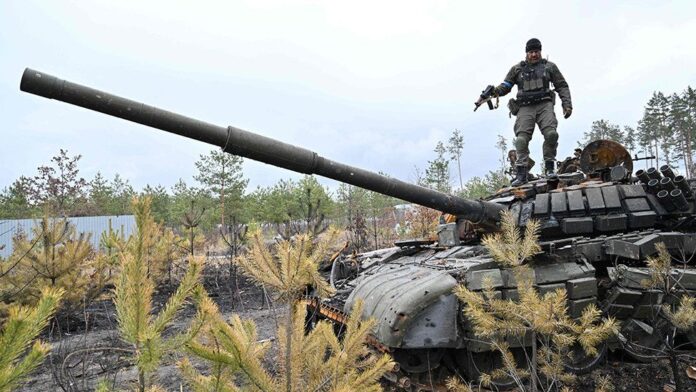It is thought that Russia has lost hundreds of tanks within two months of invading Ukraine.
Military experts put the losses down to the advanced anti-tank weapons which western nations have given to Ukraine, and to the poor way Russia has used its tanks.
How great are Russia’s tanks losses?
Ukraine’s armed forces say Russia has lost more than 680 tanks.
Meanwhile, Oryx – a military and intelligence blog which counts Russia’s military losses in Ukraine on the basis of photographs sent from the war zone – says Russia has lost more than 460 tanks and over 2,000 other armoured vehicles.
According to the Rand Corporation and the IISS (International Institute for Strategic Studies), Russia had about 2,700 main battle tanks in total at the start of the conflict.
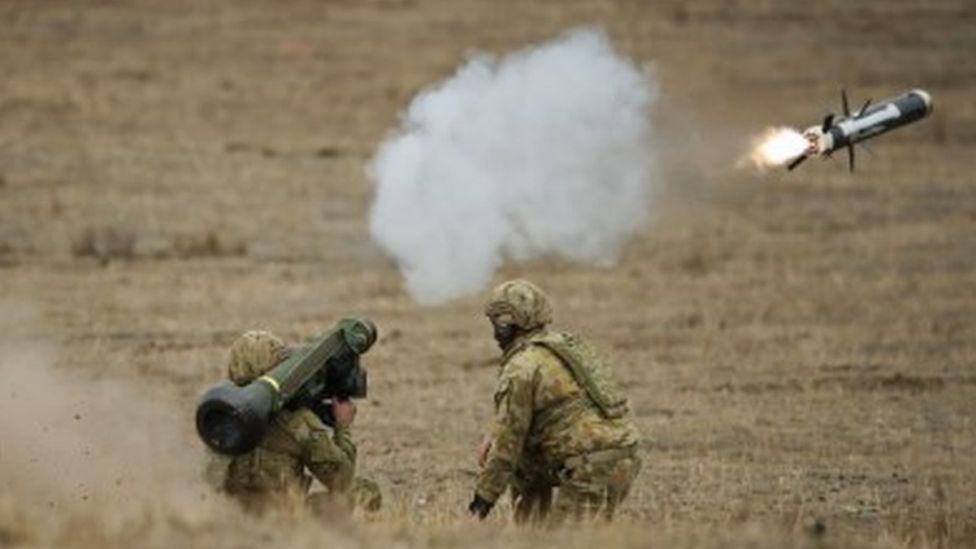 IMAGE SOURCE,GETTY IMAGES
IMAGE SOURCE,GETTY IMAGESHow effective have anti-tank weapons been?
The US supplied Ukraine with 2,000 Javelin anti-tank missiles at the start of the conflict and has since sent at least 2,000 more.
Javelins can be fired so that the missile explodes on the top of a tank, where the armour is weakest, according to manufacturer Lockheed Martin.
A lot of Russian tanks are fitted with reactive armour which absorbs the impact of missiles.
However, Javelins are fitted with two warheads. One blows away the reactive armour, and the second pierces the chassis underneath.
The UK has also sent at least 3,600 Next Generation Light Anti-tank Weapon missiles (NLAW).
These are also designed to explode as they pass over the relatively exposed turret top of tanks.
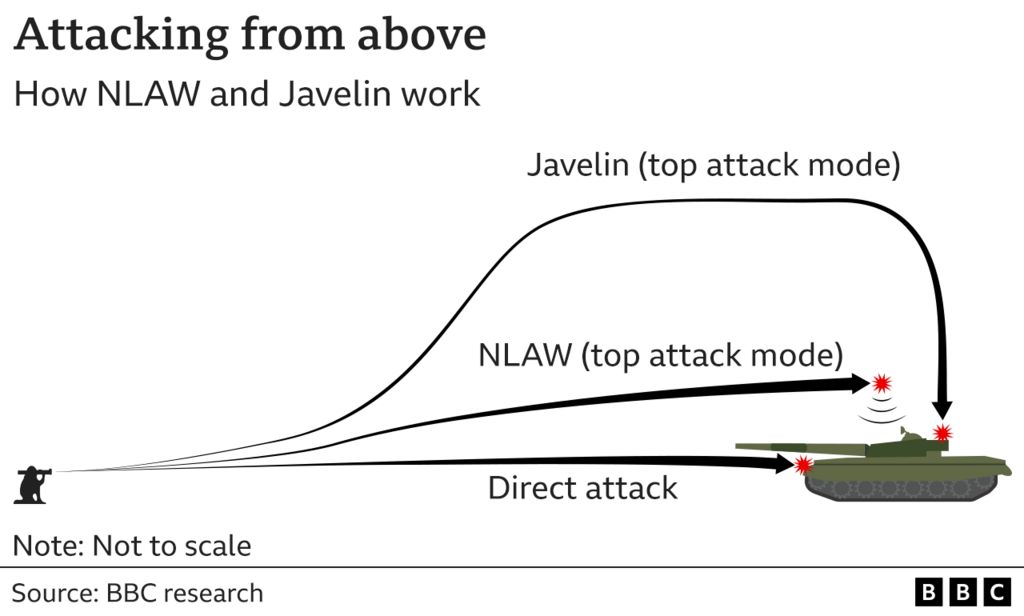
“Javelin and NLAW are very potent,” says Nick Reynolds, research analyst in land warfare at the Royal United Services Institute (RUSI). “Without this lethal aid, the situation in Ukraine would be very different.”
The US is supplying Ukraine with 100 Switchblade anti-tank drones.
Known as “kamikaze” drones, they can hover over a target miles away from the operator and then drop on top of a tank, destroying it with the warhead at their tip.
How much are Russian tactics to blame?
Nowadays, the Russian army operates through Battalion Tactical Groups (BTGs), which are self-contained combat units made up of tanks, infantry and artillery.
The precise composition of these units may vary, but generally they comprise a large number of armoured vehicles but relatively few infantry troops.
“Russia has relatively few troops to call on,” says Phillips O’Brien, a professor of strategic studies at St Andrews University, “so BTGs are a way of creating a fighting unit with lots of punch.
“They’re designed to attack quickly with lots of firepower. However, they have very little protection in terms of infantry personnel to escort them and to retaliate if the armoured column comes under attack,” he says.
“That makes the Russian army like a boxer who has a great right hook and a glass jaw.”
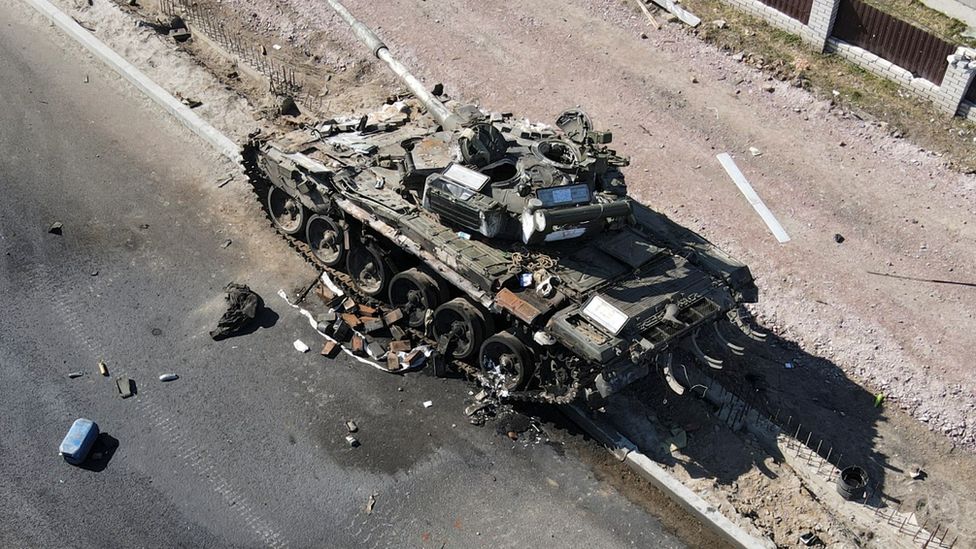 IMAGE SOURCE,GETTY IMAGES
IMAGE SOURCE,GETTY IMAGESProf O’Brien says a lack of Russian air patrols means Ukrainian troops have found it easy to get into positions to ambush Russian tank columns.
“Russia didn’t get air supremacy at the start of the conflict,” he says, “and so they cannot patrol the skies, spotting Ukrainian army movements.
“That means Ukrainian troops have been able to get into good fire positions for ambushes, and they have been able to do a lot of damage this way.”
How much is down to Russian incompetence?
According to Oryx’s figures, half of the tanks Russia has lost have not been destroyed or damaged by the enemy but have been captured or abandoned.
Experts put this down to logistical failures, and incompetence by Russian troops.
“You’ve seen pictures of Russian tanks being dragged off by Ukrainian farmers’ tractors,” says Prof O’Brien.
“Some of those tanks were abandoned because they ran out of fuel. That’s a logistical failure. Some got stuck in the springtime mud, because the high command invaded at the wrong time of year.”
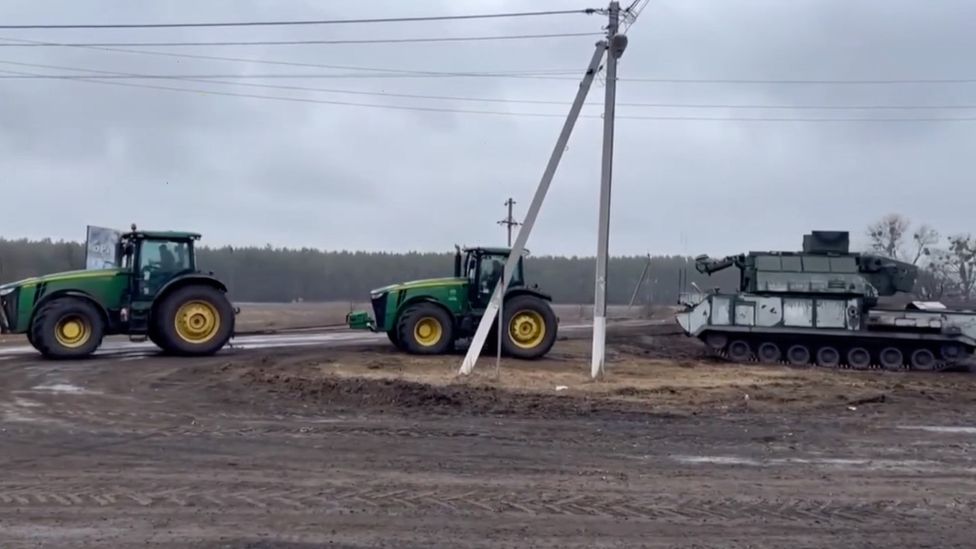
“Russia’s ground forces are made up of a lot of conscripts and recruits. That makes them, in world terms, a low to medium-quality fighting force,” says RUSI’s Nick Reynolds.
“Many tanks have been abandoned because of bad driving. Some have been driven off bridges. Others have been driven into ditches so that the tracks have come off. The ability of the troops to use their equipment has been lacking.
“But often, soldiers have simply abandoned their vehicles and fled. So the will to fight has also been lacking.”
The Ukrainian government has even issued instructions on how citizens should turn in abandoned military vehicles.
Authorities also confirmed that anyone who found such “combat trophies” did not need to declare them for tax purposes.
https://www.bbc.com/news/world-61021388



